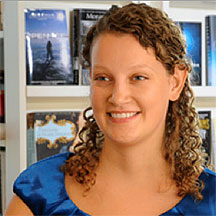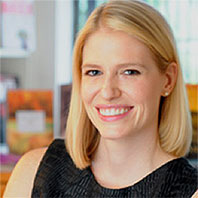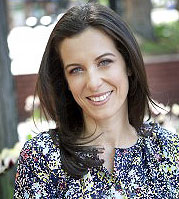
writer’s journey to publish a book can feel much like Dorothy’s journey to visit the Wizard of Oz. There’s a definite road to follow, but it’s not always easy. Unlike Dorothy, though, we don’t have to deal with lions, flying monkeys, poppy fields, or the Wicked Witch of the West on the way to our own Emerald City, a book contract with a big New York publisher. But there are other obstacles in our way.
The good news is that help is available in the form of literary agents. Similar to Glinda the Good Witch, guiding Dorothy along the yellow brick road with the goal of meeting the great and powerful Oz, a literary agent can help you navigate the publishing road and get your manuscript into the hands of an editor who hopefully likes it enough to make it into a book.

“I work directly with my writers to develop and edit their manuscripts so that what I’m presenting to editors is the strongest possible project.”
(Photo: Jessica Regel)
Acquiring a literary agent is not easy, but it’s usually a must if you want your book published by a big publishing house. Agents are there for writers and are the key to gaining entrance into this elusive world. Jessica Regel, a literary agent with the Jean V. Naggar Literary Agency, says she becomes the advocate for her authors. She promotes and supports them in any way she can. “The core of my job,” said Jessica, “is to sell my authors’ books to editors at publishing houses. However, in order to get to that point, I work directly with my writers to develop and edit their manuscripts so that what I’m presenting to editors is the strongest possible project. After the book is sold, I negotiate the contract with the publisher, act as a liaison between the author and the editor, sell sub-rights (audio, dramatic, translation rights), and process the money that is due to them.”
To be successful, an agent must stay current on the publishing industry and know the types of projects different editors and publishing houses are seeking. For Jessica, face-to-face meetings with editors provide her time to get to know them and what they like and don’t like. “We talk about books the editor is working on, books I'm working on, and industry gossip. But then we also talk about their hobbies, where they’re from, TV shows they watch, etc. I may pitch one or two projects if it fits within the context of the conversation, but my pitching is typically done after the meeting—either by phone or by e-mail.”
During the meeting, Jessica wants to get a feel for the interests of an editor and doesn’t want to take up the entire time pitching one book. “For example right now,” she said, “I’m submitting a nonfiction book with raunchy, in-your-face humor. So when I’m putting together my submission list, I’ll remember, Oh yes, that editor listens to Howard Stern. They’d be good for this project.”
So, what does a typical day at the office look like for an agent? Kristina Holmes, the founder and president of The Holmes Agency, said one of the things she loves about being an agent is there really isn’t a typical day. “My work is varied and dynamic. On a given day, I might have a marketing call with one of my authors, edit a proposal I’m working on, or negotiate a contract with a publisher. Because I own my agency, I also regularly focus on business tasks that need my attention.” She added that like so many people, she’s constantly challenged with balancing time reading e-mail with her other responsibilities.
One of the biggest myths surrounding the work of literary agents is the notion they sit at their desks reading manuscripts all day. “I rarely read during office hours.” Jessica said. “In reality, I spend my nine to five corresponding with editors and authors, processing paperwork, and submitting projects. I do the majority of my reading on the weekends.”
“I never read in the office,” said Elizabeth Evans, also with the Jean V. Naggar Literary Agency. “The fantasy of agents and editors sitting in cozy leather chairs and reading manuscripts all day is a lie! It’s a very powerful lie though, and I think it’s what drew so many of us to this work in the first place. Almost all my reading occurs in the evenings and over weekends.”

“The fantasy of agents and editors sitting in cozy leather chairs and reading manuscripts all day is a lie!”
(Photo: Elizabeth Evans)
Reputable agents do not take money upfront; they don’t get paid until an author gets paid. As a strictly commission-based business, an agent earns commission on the advance and royalties offered by a publisher to an author for her book. Jessica explained that agents only get paid if they sell their authors’ books, which is the major reason why agents are so selective and cautious in taking on new clients.
“Every agent knows the experience of working on a book for many weeks or months,” said Jessica. “And in the end, for one reason or another, not being able to secure a publisher for the book. It’s so disappointing—not only financially but emotionally as well.”
Because agents work on commission, many take on the role of editor to help clients get their manuscript or proposal in the best shape possible before submitting it to editors. Keeping her clients motivated through the long and sometimes tedious task of submitting and publishing a book can be a big challenge for Elizabeth. “Sometimes we sign projects that we feel have something special that isn’t fully developed yet,” she said. “It can be a longer path to publication. We need to keep our clients’ spirits up and keep them focused on the end goal. Since every author is different and works differently, agents have to understand how to be their client’s best coach and collaborator. This remains true through the process, through rejection letters, through deadlines with publishers, etc.
It’s not often discussed in the publishing process, but I think an important part of being a good agent is understanding how to help a writer create his or her most powerful work.”
Elizabeth enjoys working with positive-minded people who are steady, driven, and detail oriented and who also maintain a high degree of professionalism. “It is very helpful if they can look at their work objectively and be open to suggested changes,” she said.
Kristina wants writers to take a deep breath and realize that agents are actual human beings. “I think there’s such a mystique around literary agents,” said Kristina. “Probably in part because we’re often inaccessible and also because there are relatively so few of us.”
She wonders if writers fully understand the roles agents play in the publishing process. For example, she has had writers share in their query letters that they want her help publicizing the book. “While I do consult on marketing plans,” she said, “I’m not a publicist and do not typically secure media placements for my authors.”
In addition, it amazes her the amount of anxiety many writers experience. This, she believes, is because agents do have some real influence and power in the publishing process. Unfortunately, sometimes that anxiety can get in the way through awkward pitch letters, e-mail follow-up, or cold call voicemails.
“Try to remember that agents are regular people,” suggested Kristina. “We want to be moved, touched, considered, spoken to, and communicated with. We have our limitations and gifts, and we work with those each and every day. In the end, we don’t hold the cards to your career, you do.”

“Try to remember that agents are regular people . . . In the end, we don’t hold the cards to your career, you do.”
(Photo: Kristina Holmes)
Finally, the goal of the agent is exactly the same as that of the writer—to successfully get a book published. “One of my favorite moments in the process is when the publisher sends a really fantastic cover design to the author,” Elizabeth said. “Suddenly, the manuscript you worked so hard to sell takes on new life as an actual book. You see the design, your client’s name, and title; and you can imagine people finding it in a bookstore. It’s thrilling! Ultimately, the most rewarding aspect is client satisfaction—when your author is happy with the book and has enjoyed working with you and with the publisher.”
Getting a book published is definitely a journey that takes patience and perseverance. You can’t click your heels together three times, repeat: “There is no place for my book like the bookstore,” and expect to have your book be magically published. But with a literary agent guiding you down the yellow brick road of publishing, your chances of finding a home for your manuscript become more realistic.
Tips to Finding the Right Literary Agent for You
Know Your Genre
It is important to know what genre your books falls in. Basically you want to know where your book would be shelved at the bookstore. Is it mystery, romance, literary fiction, young adult? This is important because the agent will need this when pitching to an editor at a publishing house, and that editor will need the information to pitch it to the marketing team at the publishing house. Telling an agent your book doesn’t really fit into any specific genre doesn’t make her excited because your book is so unique—it makes her question how she is going to sell it. If you are not sure what genre your book belongs in, go to the bookstore and find the books that are most similar to yours.
Read the Agent’s Guidelines
All literary agents have guidelines spelling out exactly what they are looking for and how you should submit your manuscript. It is in your best interest to follow these guidelines. The agents put these out to save you and them time. Let’s say you have a young adult (YA) manuscript; and in the agent’s guidelines, it specifically says the agent does not represent YA. You now know not to send your query to her, and you just saved both of you some time. Don’t send it anyway, thinking the reason the agent hasn’t taken on any YA clients is because she hasn’t read anything as good as yours.
Once you find agents who do represent your genre, send them only what they ask for. If they say, send only a query first—then send only a query. Two great resources for finding agents guidelines are: Guide to Literary Agents and online at Agent Query.
Write a Good Query
A query letter is a one-page sales pitch and is your opportunity to impress an agent with your manuscript idea and writing style. Agents are busy people, so start with a strong hook to catch their attention. You will want to follow that with a brief synopsis of the book (think back book cover), including word count and genre, and end with a short paragraph about you. Other potential items you can weave in: if you met the agent at a conference, if you recently read something on the agent’s blog, if the agent represents an author who writes in a similar genre as you, or mention books currently in the market that are similar to yours.
Be Professional
Publishing is a business and something to remember when you get to the point of submitting your manuscript. It can be difficult when you have spent months or even years working on a manuscript, pouring your heart and soul into it, and then putting it out there—knowing there will probably be agents who are not interested. This is the time to take off your writer hat and put on your business hat and remain professional with all your interactions with the agents. If an agent says she is not interested in your manuscript, then thank her for her time and move on. It is not the time to get defensive or even ask why she didn’t like it. Agents have to be very selective with the projects they take on, and they each have their own likes and dislikes. Be respectful of that and be professional.
Find the Right Agent
Finding a literary agent can be hard work, but finding the right literary agent can be even harder. Just because an agent says yes she likes your manuscript and wants to represent you, doesn’t mean you have to sign her on. The relationship between you and your agent will hopefully be a long-term one, so you want to find someone you can work with and who shares a similar vision for your manuscript. This is a partnership and one that must be approached with thoughtful consideration.

Kerrie Flanagan is a freelance writer and director of Northern Colorado Writers. Her 130-plus articles can be found in various national and regional publications and her essays in a variety of Chicken Soup for the Soul books. You can visit her website at https://www.kerrieflanagan.com.
(Photo of Kerrie Flanagan by Norm Rehme)
-----
To learn how to pitch to an agent at a writer’s conference read Kerrie’s article:
https://wow-womenonwriting.com/35-How2-PitchAgent.html